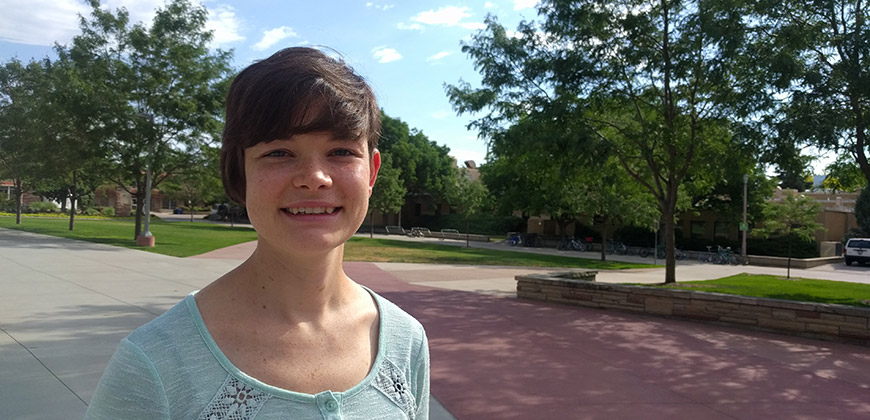
Crystal Vander Zanden, age 23, has completed her Ph.D. in biochemistry from CSU.
Most college students finish their undergraduate degrees around the age of 22. But Crystal Vander Zanden isn’t most students.
The 23-year-old Arizona native is leaving Colorado State University a newly minted Ph.D. in biochemistry – the youngest ever from the Department of Biochemistry and Molecular Biology.
The soft-spoken, unassuming Vander Zanden defended her Ph.D. thesis in June, and is now packing up her apartment in Fort Collins after spending six years working toward her doctorate. In the fall, she will begin a National Institutes of Health-funded postdoctoral fellowship at the University of New Mexico. There, she’ll conduct research on biophysical characterization of Alzheimer’s Disease-related protein aggregation, while also teaching courses at a local community college.
Early path
Growing up in Glendale, Arizona, Vander Zanden was home-schooled – an environment in which she quickly advanced at her own pace. At age 8, she asked her mother if she could enroll in a biology course. After passing an entrance exam, Vander Zanden took her first college-level course at Glendale Community College, at the age of 9. At age 13, she graduated from Glendale High School.
She went on to Nebraska’s Doane University (then Doane College), majoring in biochemistry. She was a student researcher in the lab of Assistant Professor Erin Wilson, studying the biochemical properties of protein adsorption in bone. While in college, her family – mom, stepdad and younger siblings – all moved to Nebraska.
Choosing CSU to pursue a Ph.D. was a no-brainer for Vander Zanden, who was 17 when she visited Fort Collins for the first time and interviewed for the graduate program. She fell in love with campus, and with the small, close-knit biochemistry department. She chose CSU over two other Ph.D. programs.
“People were laid back, but still doing fantastic science,” she said.
Before she turned 18, Vander Zanden began her Ph.D. under the mentorship of Professor Shing Ho. With Ho, she learned “how to think as an independent scientist,” to come up with her own questions, and to “figure out what’s interesting about the data you’ve just collected.”
Her Ph.D. examined the mechanics and functions of a DNA marker called hydroxymethylcytosine. The marker plays an important role in DNA recombination, the process by which damaged DNA fixes itself.
Ho said when Vander Zanden first joined his lab, she was put on a project about halogen bonding. Soon after, he asked her to change focus to the new study – on which she would eventually write her thesis – for determining hydroxymethylcytosine’s role in recombination. This switch required Vander Zanden to learn techniques Ho’s lab was not expert in, and to create an entirely new research direction.
“It took determination and real courage as a scientist to take this leap of faith, and I could not imagine any other student of her age, or any age, taking on such a challenge,” Ho said.
A compassionate individual and a source of intellectual and emotional support for many, Vander Zanden has earned the respect of students, faculty and others around her, Ho said. “It has been a genuine honor to have played a part in helping Crystal find her passion in science and in teaching these past six years.”
Finding a passion for teaching
During her time at CSU, Vander Zanden received a National Institutes of Health pre-doctoral fellowship, and also received the College of Natural Sciences Graduate Student Excellence in Teaching Award. At the time, Vander Zanden was a teaching assistant in two courses, including physical biochemistry – among the most challenging of undergraduate courses for biochemistry majors.
Vander Zanden said she routinely had 10 or more students crammed into her graduate student space during office hours. And it was through these types of experiences that she discovered how much she enjoys teaching.
“It was an awesome thing to teach students until they actually understood something, and they felt empowered within themselves,” Vander Zanden said.
She is also not one to take education – and the opportunities she has embraced – lightly.
“Education is one of the only means we have in our society to do better than our parents,” she said. “It’s an amazing thing … and I want to be a part of that.”
When Vander Zanden first applied to the Ph.D. program at CSU, her mom came with her, because Vander Zanden was not technically an adult. Besides some minor social setbacks with being under the legal drinking age for most of her time here, being younger has not been a major factor, with her peers or her students.
Though, “driving was an issue in undergrad,” she recalls. “I was able to drive the same year everyone in my class was able to drink.”